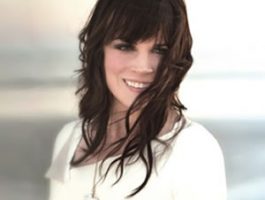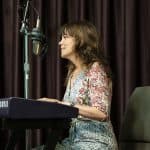
A God-Purposed Plan
Her job prospects looked bleak. After several closed doors, Ginny Owens began to realize that school administrators were unreceptive to hiring a blind music teacher. Opting for Plan B, she began graduate studies and settled for a desk job. Unfulfilled in both, Ginny wondered if she would ever feel hopeful again. Hear Ginny tell how God used that time to prepare her for a music career she could hardly imagine.
Show Notes
About the Host
About the Guest
-
Her job prospects looked bleak. After several closed doors, Ginny Owens began to realize that school administrators were unreceptive to hiring a blind music teacher. Opting for Plan B, she began graduate studies and settled for a desk job. Unfulfilled in both, Ginny wondered if she would ever feel hopeful again. Hear Ginny tell how God used that time to prepare her for a music career she could hardly imagine.
-
Dave and Ann Wilson
Dave and Ann Wilson are hosts of FamilyLife Today®, FamilyLife’s nationally-syndicated radio program. Dave and Ann have been married for more than 38 years and have spent the last 33 teaching and mentoring couples and parents across the country. They have been featured speakers at FamilyLife’s Weekend to Remember® marriage getaway since 1993 and have also hosted their own marriage conferences across the country. Cofounders of Kensington Church—a national, multicampus church that hosts more than 14,000 visitors every weekend—the Wilsons are the creative force behind DVD teaching series Rock Your Marriage and The Survival Guide To Parenting, as well as authors of the recently released book Vertical Marriage (Zondervan, 2019). Dave is a graduate of the International School of Theology, where he received a Master of Divinity degree. A Ball State University Hall of Fame quarterback, Dave served the Detroit Lions as chaplain for 33 years. Ann attended the University of Kentucky. She has been active alongside Dave in ministry as a speaker, writer, small-group leader, and mentor to countless wives of professional athletes. The Wilsons live in the Detroit area. They have three grown sons, CJ, Austin, and Cody, three daughters-in-law, and a growing number of grandchildren.
-

Ginny Owens
A three-time Dove Award winner, Ginny Owens became a household name when she was named Gospel Music Association’s New Artist of the Year in 2000. In a career that has spanned fifteen years, Ginny’s seven studio recordings have amassed nearly one million records in sales and spawned career-defining number ones like “If You Want Me To” and “Free.” Her songwriting prowess has earned her song cuts by artist peers like Rachael Lampa and Christian music leg...more
Ginny Owens’ job prospects looked bleak. She realized that schools were unreceptive to hiring a blind music teacher. Ginny tells how God used that time to prepare her for a music career she could hardly imagine.
Bob: I would have to think you feel a special kinship with Frances Jane VanOlsteen. Do you know who that is?
Ginny: No. [Laughter]
Bob: Well, most of us know her as Fanny Crosby.
Ginny: Oh, yes. I don’t think I knew that was her name.
Bob: Yes. She was a hymn writer—
Ginny: Yes.
Bob: —loved Protestant hymns.
Ginny: Yes, definitely.
Bob: She was blind.
Ginny: Yes.
Bob: So many of her songs—even as I heard you singing about that day when darkness fades—we don’t typically think about darkness fading / we think about the light fading.
Ginny: Yes.
Bob: But so many of her songs talked about “visions of rapture bursting on my sight” and about “that day when sight returns.” Is she somebody that—do you feel kinship with her?
3:00
Ginny: Oh, I do! I wish I could write lyrics like that—[Laughter]—but I do [feel a kinship]. I just—you know, I can’t even imagine when she lived, what she must have faced, as a blind person, as far as—you know, now, we’ve come so far, and people are far more accepting, and there’s technology to get done what we need to get done. Man, I just am so grateful that she had the opportunity she did to share her music with folks and with churches—and for people to embrace the hymns that she wrote. It feels like just such a God-appointed thing that she would even have that opportunity to share her music—especially in that time, when folks would have thought, “Well, a blind person really can’t do anything.”
Bob: It doesn’t have to be one of Fanny’s songs, but we do have our staff here with us. Would you lead us in a hymn that, maybe, we could all sing together?
Ginny: Absolutely!
4:00
[Singing Be Thou My Vision]
5:00
6:00
Bob: Do you remember learning that hymn? I’m just thinking Be Thou My Vision would have more significance for you than it did for me when I was growing up.
Ginny: You know, I remember learning it, and I remember loving it; but it wasn’t until I was an adult that I actually thought about what the words meant and how they might be significant. I think when you—I don’t know—when you’re blind, it’s just not obvious to you that you’re blind. You don’t sit around thinking about it; right? [Laughter] So I just never really even thought about it that way—I thought: “What a beautiful prayer. I want God to be my vision.” Then, when I was older, I think someone actually pointed that out to me at a concert one time; and I thought, “Oh, yes! I guess it does relate.” [Laughter]
7:00
Dennis: As I was reading through the story of your life, and just the faith lessons that you pass on through your book, I was just, over and over again, struck with your courage. I thought, “I’m going to ask her my favorite question to ask.”
Ginny: Uh-oh! I am very scared.
Bob: You have—this is—you’re one of dozens who have been intimidated by this question.
Ginny: Oh, goodness.
Dennis: I want to tell you what courage is: “Courage is doing your duty in the face of fear.” If that’s the definition of courage, what’s the most courageous thing you have ever done?
Ginny: Whoa! Can we come back tomorrow? [Laughter]
Bob: A little time to meditate on that one. [Laughter]
Ginny: I think the most courageous thing for me is probably not that different than the most courageous thing for everyone else too—that is learning to be honest about who we are / who we’ve been—all of our broken parts.
8:00
You know, I think one of the things that I keep realizing every day—that just is amazing and humbling—is it’s really not the put-together us that inspires and encourages people—it’s the broken pieces. It’s me saying: “Yes, on this hand, I’m blind. On the other hand, there are days when that is really hard.” You know, it’s the broken pieces of us that I think have the power to impact lives. I really do. So I think the courage, for me—and maybe, like I said, for all of us—is being honest / being honest about who we are, being honest about what we’re wrestling with, and then being honest about how God has really moved in those times in our lives.
Bob: You share in your book about a friend from college—is it Charlynn? Is that her name?
Ginny: Yes.
Bob: You say that, “After we graduated, she got married; and I got a record deal.”
Ginny: Yes.
9:00
Bob: You say, “There was always an expectation, somewhere in the back of my mind, that I would find my soulmate during or soon after college.” You say, “I didn’t put my life on hold, but I did live as if settling down was coming soon.” Even as you signed your record deal, you said, “I was buying dishes and a dining room table that could seat eight people.”
Ginny: Yes.
Bob: And when you were off the road, you had friends come over, and made home-made dinners, and collected recipes, and learned how to bake bread, and started nesting. You say, “Lo, these many years later, my perspective and circumstances remain largely unchanged.” You say, “I nest less; but I’m more confident in the knowledge that I don’t need another person to complete me, but the desire is still very present.”
Ginny: Right.
Bob: Talk about where you are and about your wrestling with this, as a young single woman.
10:00
Ginny: Well, I think one of the very terrible mistakes that I made in the season, when I really began to wrestle with this after college, was that it was always hope, in the back of my mind; but it wasn’t always a request on my lips to God. It was not—it was something I always dreamed about. It probably took up a good deal of brain space; but because God didn’t bring someone along immediately, I began to just not ask anymore.
I think one of the things that ended up happening, as a result of that, is I began to not really talk to God as much about the desires of my heart. I don’t think our conversations were as honest. I think my prayers were about, you know, things that were going on on a daily basis or prayers for my family; but I started to withhold the most important parts of me from God. I started to kind of keep those back.
11:00
So, now, as I look back over that, I have decided that I definitely don’t want to live in a place where God is not in the middle of my singleness. There’s a verse I’ve found that I love. I’m trying to remember what the reference is right now; but I have it in my prayer journal, and I look at it every day. It says something like, “For I am your husband, your maker.”
I’ve heard people for years say—girls, for years—say, “You know, God is my husband.” I’ve kind of been like, “Yes, that’s great, but I want a real husband.” Then I’m like, “No, really, that is the role that He is to fill in our hearts.” Honestly, it’s the role that each of us, male and female, want Him to fill because, you know, if He is not in that place of honor—if He is not in the most important place / the most precious place in our hearts, then any relationship we have is not going to work. It’s going to fall apart, as we all know.
12:00
And then, also, I think I’ve had to learn to give Him, continually, the desires of my heart again and to talk to Him about those. I think it has made being single much easier because I focus on much different things now. We’ll see where the journey goes.
Bob: You’ve had friends, along the way, who’ve tried to set you up on—pardon the expression, blind dates—who have tried to fix you up. You’ve had relationships that, as you said, didn’t go well. Some of those blind date experiences didn’t go well either; right?
Ginny: Yes, there was one where my friend was like: “I want to set you up with this friend of mine. He’s so great! Since you can’t see him, you won’t even know that he’s just not cute at all.” I was like: “Wow! Well, I might be shallow enough to care about that, though.” [Laughter]
Dennis: Actually, you wrote in your book that the person said to you, “The great thing is—you won’t even mind that he’s so ugly.”
Ginny: Yes. I don’t know what she said, but it was something like that. It was definitely along those lines.
13:00
Bob: Your experience, as a child, growing up in a home where divorce was present—how has that shaped your thinking about marriage and your desire for a home?
Ginny: Well, it’s certainly made me want to have a whole, complete relationship where, you know, God is obviously first and where a marriage is healthy. You know, I’ve always even assumed and imagined that kids would be part of that. You know, I think a lot of us who come from divorced homes, we really want to do it right the next time / we want to make things work out really well. We want to do everything we can to figure out how to not repeat divorce. But there have definitely been many things to look back on, as an adult, and say, “Okay, I want to do this differently, and I also want to work through this so I think healthfully about it.”
Dennis: You met a young lady by the name of Ranelle. Is that how you pronounce it?
Ginny: Yes.
14:00
Dennis: —who impacted your life—tell us about her—and then, you were able to finish a song, you had worked on for years, that I’d like for you to sing for our audience.
Ginny: Sure!
I met Ranelle when she was 20 years old. She had been a patient at St. Jude’s Children’s Hospital in Memphis for, I think, about four years when we met. She had been battling some pretty tremendous cancer that was just taking over her body. She had had chemotherapy and all different kinds of treatments, and then she had had a short period of remission. By the time I met her, the cancer was back. She had lost most of one of her legs, and she was on all kinds of intensive pain meds.
But Ranelle’s dream, really, was to, of course, be healed and for there to be a miracle of healing in her life, and then to travel around the world, and share her writing and share her music with people, and tell them about Jesus—and tell them what He had done for her.
15:00
She also knew the reality was she might find that her next moment was in the arms of Jesus. She would always tell me, “Either way, I win.”
I always thought, “When you’re 20 years old, or when you’re any age, what does it look like to surrender your life to the point where you can say, ‘Either way, I win—whether my next breath is my last or whether I’m traveling the world, singing about Jesus—I win’?” So that was always just—that just always broke me.
But that very first day when we met, she and I sat down to write a song together. I brought a chorus of a song that I had been—I had had for about ten years. I’d been trying to write the verses with different people—we just couldn’t get it done. So I played the chorus for Ranelle because it’s always good to have somewhere to start. She immediately just said: “Oh, yes! Let’s definitely write verses to this.”
16:00
I think Ranelle knew so much about what it looked like to surrender / to say, “Amen,” to God in every circumstance of her journey. We sat down and wrote the verses that went with the chorus in about 20 minutes. We recorded it and got to sing it several times over the course of the next few months at different concerts of mine. She did a concert that I got to open for her, and we sang it. Then, I had to sing it by myself at her memorial service. She had inspired so many lives and there were so many people there to celebrate. It was then that I concluded that each of us is a story that is part of God’s bigger story. The question that we get to ask every day when we get up and look in the mirror is: “How does my story read? What do other people see when they read my story?”
So, for me, Ranelle really taught me that because people read hope and they read the good news of Jesus in her story.
17:00
They read “overcoming”—not only in the sense of being able to spend eternity with Jesus—but also overcoming in the sense of getting up every day when you don’t feel well, and going about your life and pursuing it, and pursuing other people in love.
Bob: Let’s hear the whole song. Can we?
Ginny: Sure!
[Singing Say Amen]
18:00
19:00
[Applause]
20:00
Dennis: Well, I want to thank you for sharing your gifts with our audience, here at FamilyLife—before the live audience here—but also with a lot of listeners around the country. I think you have moved many of them and challenged them to move from unbelief and losing hope back to faith, and trust, and leaning back in to the Savior who they ultimately want to obey and follow. Thanks for joining us. I hope our listeners will get a copy of your book, Transcending Mysteries. It’s a great book.
Ginny: Thank you.
Dennis: It’ll teach all of us how to walk by faith and not by sight.
Bob: You guys thank Ginny Owens; will you? [Applause]
Ginny: Thank you so much!
[Studio]
Bob: Well, again, it’s been fun to listen back to the conversation with Ginny Owens and to hear her share her story. In fact, the programs we did—I mentioned this earlier / programs with Jeremy Camp—these are great stories of people who have learned to persevere and walk by faith.
21:00
Dennis: And they’re great lessons of walking by faith. Back to how she answered the question when I asked it: “What’s the most courageous thing you’ve ever done?”—she said, “Learning to be honest about who I am.”
Maybe your discussion, as you head to grandma’s house for the holidays—perhaps the question needs to be asked in the car: “What’s the most courageous thing you’ve ever done?”—just getting real about “Who I am,” and “Who I am not,” and accepting that, and embracing that as a gift from God—and say, “Okay, let’s get on with life.”
Bob: We have a little bit of a holiday treat for our listeners if you’d like to listen again to Ginny Owens singing Be Thou My Vision. We’ve got the music video on our website at FamilyLifeToday.com, along with links to a couple other music videos that Ginny has put together. We’ve got her CD / her hymns CD available for order. So, if you’d like to order a copy of the hymns CD, go to FamilyLifeToday.com and order online.
22:00
Or call: 1-800-“F” as in family, “L” as in life, and then the word, “TODAY.”
Ginny has also written a book, along with Andrew Greer, called Transcending Mysteries: Who Is God and What Does He Want from Us?—a great gift to give, and to read aloud to somebody you know who may be blind, or to give to someone who is a big Ginny Owens’ fan. Again, the book is called Transcending Mysteries. You can order it from us, online, at FamilyLifeToday.com; or you can call to order: 1-800-358-6329—that’s 1-800-“F” as in family, “L” as in life, and then the word, “TODAY.”
Now, here on Thanksgiving Eve in the United States, we are thankful for those of you who listen each day to FamilyLife Today and those of you who support this ministry. We are listener-supported. The funding we need to do what we do—this radio program, our events, our resources, and our website—all of that is underwritten by folks, like you, who make an occasional donation in support of this ministry or, if you’re a Legacy Partner, those of you who give each month to support the work of FamilyLife Today.
23:00
We’re grateful for your financial support. We just want to say, “Thank you for partnering with us.”
If you can help with a donation today, we’d like to express our thanks by sending you a book that Barbara Rainey has written for families called Growing Together in Gratitude. This is a collection of stories that are all about having a thankful heart. These are great to be read at the dinner table, as part of family devotions, or older children can certainly read the stories on their own. The book is our gift to you when you make a donation in support of the ministry, which you can do, online, at FamilyLifeToday.com; or you can call and request a copy of the book as you make a donation. Call 1-800-FL-TODAY. Or mail your donation to us at FamilyLife Today at PO Box 7111, Little Rock, AR. Our zip code is 72223.
24:00
And be sure to be back with us tomorrow if you can carve out some time. Notice how I did that?—turkey day tomorrow—“carve out some time.” If you can carve out some time to be with us, we’re going to hear from Priscilla Shirer on how we can trust God even when circumstances aren’t going the way we expected them to. That comes up tomorrow. I hope you can join us.
I want to thank our engineer today, Keith Lynch, along with our entire broadcast production team. On behalf of our host, Dennis Rainey, I’m Bob Lepine. We’ll see you back next time for another edition of FamilyLife Today
FamilyLife Today is a production of FamilyLife of Little Rock, Arkansas.
Help for today. Hope for tomorrow.
©Song: Be Thou My Vision
Artist: Ginny Owens
Album: Without Condition, 1999, Rocketown Records
©Song: Say Amen
Artist: Ginny Owens
Album: Say Amen: Hymns and Songs of Faith, 2009, LUCD/ChickPower Music
We are so happy to provide these transcripts to you. However, there is a cost to produce them for our website. If you’ve benefited from the broadcast transcripts, would you consider donating today to help defray the costs?
Copyright © 2015 FamilyLife. All rights reserved.
1




